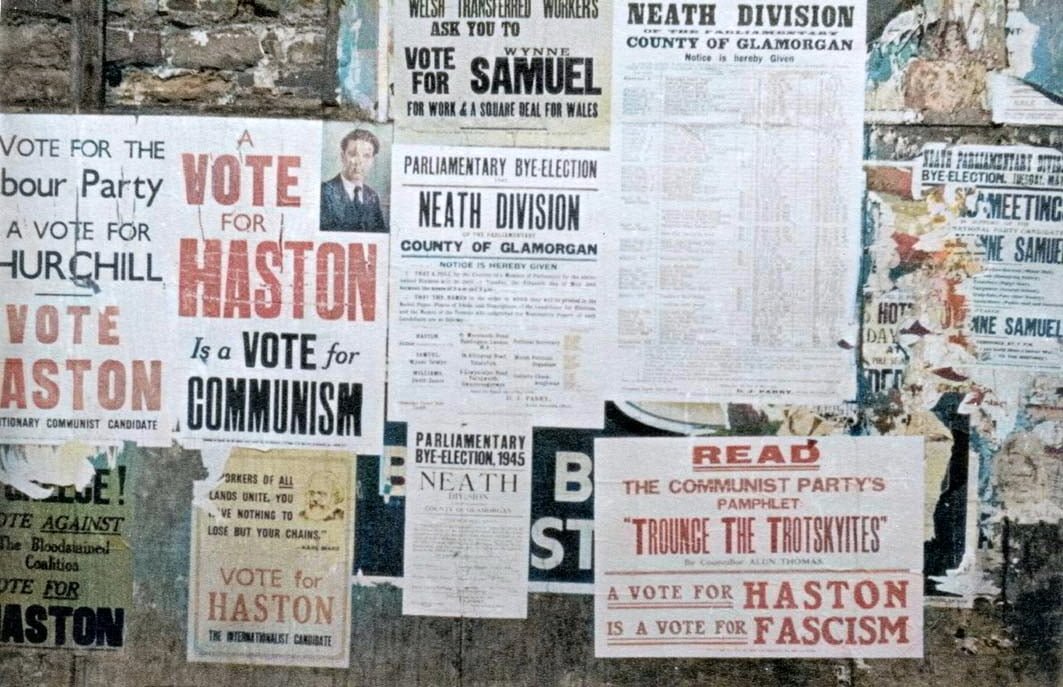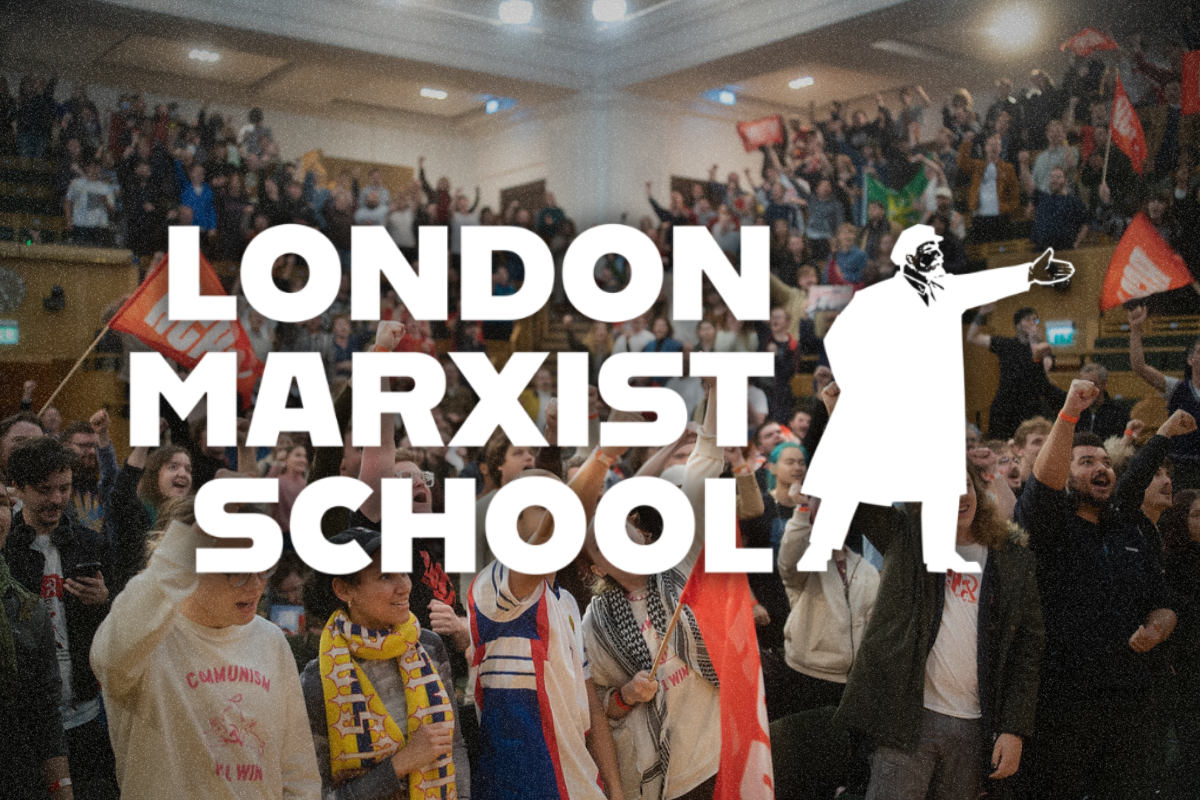Put yourself in the shoes of a worker in Britain during the Second World War.
Hitler’s armies have invaded France, posing the real possibility of a fascist invasion. The government is conscripting young people into the mines and factories. The cost of living is sky-rocketting while wages stagnate. Food rationing is rolled out across the country. All the while, the war industrialists are making bumper profits.
In a state of desperation, where do you look to vent your anger?
The Labour Party, perhaps? Well, Labour was in a wartime coalition with the Tories, making them a junior partner in a capitalist government.
How about the Communist Party (CP)? Surely, they want to get the Tories out? Wrong. They were just as disappointing as today’s ‘Communist’ Party.
Towing the line of the Soviet bureaucracy, which had made an alliance with British imperialism, the CP gave uncritical support to Churchill’s coalition government. This was justified using the Stalinist ‘theory’ of Popular Frontism.
With no political expression for your seething anger, you might look towards your trade union. Waves of strikes had broken out across Britain (these had, by the way, been made illegal).
But the meek trade union leaders were holding back the class struggle, in the name of ‘supporting the war effort’.
Even the CP leaders – so-called ‘Leninists’ – faithfully towed the line of Churchill and the British ruling class, becoming the most zealous strike-breakers.
Revolutionary Communist Party
Imagine being a genuine communist at this time. How would you connect with the rapidly maturing revolutionary consciousness of the masses?
In March 1944, Ted Grant – the founder of the IMT – along with other committed Marxists, founded the Revolutionary Communist Party (RCP). The party had hundreds of members. And unlike previous Trotskyist groups in Britain, it was decidedly proletarian in character.
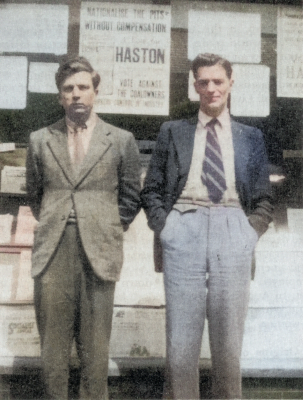
This bold name was designed to draw a clear line between the genuine communists, standing on a revolutionary Leninist programme, and the scab leadership of the official CP, who had nothing but reformism and chauvinism to offer the working class.
The RCP meant serious business. They had a perspective of a revolutionary wave breaking out following the war, in which they could lead the workers to victory. Their 1942 perspectives document was titled Preparing for Power.
The party’s activity was aimed at raising the fundamental tasks of the working class in the clearest and most principled way. They were the only party willing to defy the anti-strike laws and fight shoulder-to-shoulder alongside the workers.
Threat to capitalism
After playing a leading role in the apprentice’s strike, and winning over its best militants, the British state and the right-wing press launched a vitriolic smear campaign against the RCP.
Understanding that the RCP was a genuine threat to British capitalism, the party’s offices were raided by the police. General secretary Jock Haston was jailed on trumped up charges, along with three other leading Party members.
The RCP energetically campaigned against these charges, in the factories and in the labour movement, winning wide support. This led to their comrades’ release and the verdicts being overturned.
The RCP’s agitation was so successful that the spectre of communism even cast its shadow into the British armed forces.
In El-Alamein, the officers set up a mock ‘Forces Parliament’ to keep the troops entertained. To their horror, the main cabinet positions, including the prime minister, were won by Trotskyists from the RCP, standing on a programme of nationalising the banks, the land, the mines, and industry.
Needless to say, this parliament was quickly disbanded.
Audacity and militancy
French revolutionary Georges Danton once remarked that the most important characteristic of a revolutionary is “audacity, more audacity, always audacity”. The RCP exemplified this attitude.
Perhaps the RCP’s most audacious effort was their decision in 1945 to run in a surprise by-election in Neath, South Wales, where the sitting MP had died.
Neath was a Labour and communist stronghold; a mining town with a rich, militant, working-class heritage.
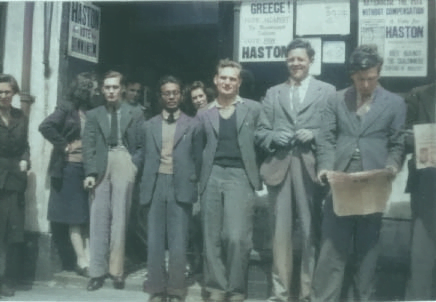
South Wales had a very high level of strike activity compared to the rest of the country. The advanced workers were rightly repelled by the scab leaders of the CP, and were wide open to a genuine communist programme.
Moreover, the Tories weren’t contesting the seat because of their electoral truce with Labour, so there was no risk of splitting the left vote.
Seeing a favourable situation open up before them, the RCP grabbed the bull by the horns, and ran Jock Haston as their candidate.
They rented an office in the town centre as a HQ for the campaign. Comrades put in holidays at work. In total, 400 activists were bussed in to carry out the campaign.
They plastered the town in posters, leafletted, door knocked, sold their paper Socialist Appeal, delivered speeches, held debates, and engaged in thousands of political discussions with these militant workers.
Their programme was uncompromisingly communist, with bold demands including:
- The nationalisation of the commanding heights of the economy under workers’ control;
- Confiscation of all war profits;
- Repealing of the anti-strike laws;
- Clearing out reactionary officers in the armed forces; election of officers by the ranks;
- Freedom for Ireland, India, and all British colonies; the immediate withdrawal of British armed forces from the colonies;
- An internationalist appeal to the workers of Germany and the rest of Europe to join the socialist struggle against Nazism, fascism, and capitalist oppression, as part of a struggle for a Socialist United States of Europe.
Challenging the Stalinists
These demands were resonating with the workers in the coalfields and factories – much to the horror of the Communist Party, who were losing their grip over the workers.
At a miners’ event, Haston put forward the RCP’s programme to a rapturous applause. They were the talk of the town. “Go into any cafe or pub and the subject under discussion is the by-election – the difference between the Trotskyists and the Stalinists,” reported the Socialist Appeal, the RCP’s paper.
The comrades also organised flying rallies, which visited the different pits in the area:
“At most of the pits in the district we had the opportunity of taking meetings with a loud speaker van where the miners listened attentively to our case, which was discussed throughout the campaign down the pits. At Cefn Coed Pit the tubs were coming up chalked ‘Up with Haston’.
“When we offered the ‘mike’ to Stalinists who had been slandering us in this pit, they got out of the way. This had a profound effect on the workers and considerably increased our support.”
Desperate not to be embarrassed on their home turf, the Stalinists (along with the Daily Mail), launched a hysterical campaign of abuse, lies, and slander toward the RCP, accusing them of being “Hitler’s agents”. Shamefully, one CP poster read: “Trounce the Trotskyites…A vote for Haston is a vote for fascism.”
In response, the RCP demanded an open debate. This was rejected multiple times, until pressure from the CP rank-and-file itself gave the leaders no choice. On 13 May, on the eve of the election, over 1,500 workers spilled out of the town hall, eager to watch the debate.
The Stalinists opened by launching an unhinged tirade of abuse, including threatening to shoot the Trotskyists dead!
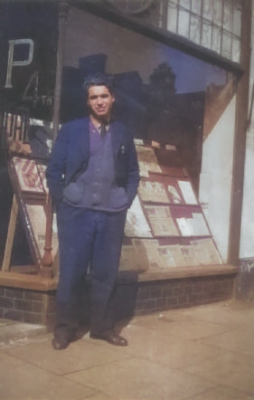
Haston stood up, and tore the Stalinist’s lies apart, using facts, figures, and arguments. He then concluded:
“In the course of the campaign we have attempted to raise the fundamental political issues before the working class. Anyone who has studied the literature of His Majesty’s Communist Party or attended their meetings, will find concentrated slander but no political attack.”
The RCP wiped the floor with the Stalinists, embarrassing them in front of the most advanced workers on their own patch!
Communist traditions
The intervention was a massive success. 1,781 people voted for a genuine communist programme, three days after VE Day.
Of course, the comrades never expected to win the election. But they sought to use the campaign as a tribune for communist ideas, and a lever to build the party.
The campaign injected a new-found revolutionary enthusiasm into the area, raising the sights of the most advanced workers.
The party sold stacks of literature: completely selling out of The ABC’s of Trotskyism, and selling 7,500 copies of their special election edition of the Socialist Appeal – meaning that one in every three households bought a copy!
They built new strong branches based on the industrial working class – miners, metal workers, and young people – and won over scores of members from the CP.
This was all achieved in an area they previously had no presence or influence whatsoever, laying strong foundations for the future growth of the organisation.
Boldness and audacity mean understanding what the objective situation demands of us; showing initiative; taking advantage of opportunities; and waging an implacable struggle to smash through all obstacles in our path.
Ted Grant, Jock Haston, and our comrades in the RCP are shining examples of what it means to be a Bolshevik. These are our proud traditions.
We must earn the right to stand on the shoulders of these giants, as we build towards the launch of the new Revolutionary Communist Party this May.
This is the second part in a new series on the history of the RCP, appearing regularly in the pages of The Communist. See here for the first part on the position of the Trotskyists towards the partition of Palestine. And read more here about how you can help build the Revolutionary Communist Party that we are founding today.

